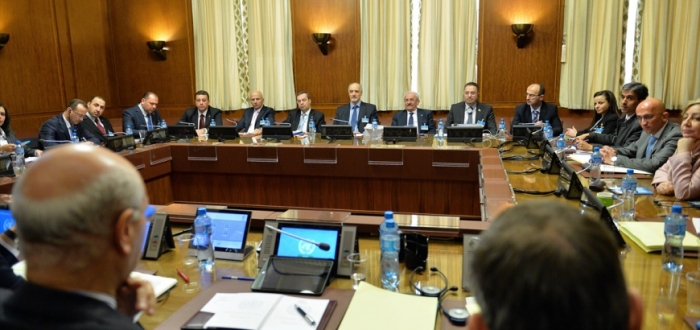The Geneva III negotiations are still stumbling, despite the efforts of the UN envoy to Syria, Staffan de Mistura, who roves between the opposition and regime delegations. At the same time, Russian-American communication continues, with the apparent goal of preventing the collapse of talks which seem not to have begun yet.
Who is responsible? The regime and opposition have traded accusations that the other is derailing the talks, while the regime continues to implement a “scorched earth” policy against the cities outside its control in Syria, and, with its ally Russia, continues to use all types of heavy weapons. At the same time, the head of its delegation in Geneva, Bashar al-Jaafari, claims his regime is ready to commit to a ceasefire. In parallel, the regime and Lebanese Hezbollah militia continues their siege of the town of Madaya in the Damascus countryside, where the number of dead from starvation and malnutrition is on the rise.
It seems President Bashar al-Assad’s regime used the wavering talks in Geneva to make advances on the battlefield, especially in the northern Aleppo countryside, while not differentiating between civilian and military in their targets. Regime forces have moved closer to the Shiite towns of Nabul and Zahraa, which are loyal to Iran, while at the same time advancing in Syria’s south and pursuing a policy of crushing one region after another. This follows from the regime’s view that as its battlefield victories increase it can impose concessions on the opposition.
For its part, the Syrian opposition faces pressure from countries led by America, at a time when a large number of the Friends of Syria Group nations are backing away from supporting their cause, according to a number of opposition members. The opposition faces a proposal which, if implemented, will be an achievement for the regime and its ally Russia, at least in the short term.
The opposition’s position and its response in the negotiations is a focus of international interest and is also important for the UN envoy, primarily due to its control of large and strategic areas on the ground in Syria. It is not possible to exclude the opposition delegation in Geneva which emerged from the Riyadh conference from any proposed solutions to solve the Syrian issue, because it includes representation from military factions who have weight in how the battles are waged.
De Mistura made one of the goals of Geneva III to arrive at a ceasefire, but this goal is not far off from the strategy drawn by the regime and Russia, which eventually leads to the regime’s military domination on the ground on one hand, and an increase in the chance that Assad can remain in power on the other. According to Al-Souria Net’s sources, the opposition faces pressure and demands to reach a ceasefire agreement as a first step in its deal with the regime’s delegation, in exchange for bringing humanitarian aid into blockaded regions by regime forces.
The danger lurks that the opposition will agree to this option, in that it has backed down from considering humanitarian issues (stopping bombardment, bringing aid to blockaded people, and releasing prisoners) outside the scope of the negotiations as it is a legitimate right of the Syrian people confirmed by de Mistura during his recent meeting with the opposition delegation in Geneva.
The opposition is calling for the negotiations to proceed based on three steps, with any flaw in their arrangement causing negative consequences for the Syrian issue.
The first step is to implement the opposition’s humanitarian demands (noted above) before entering into the negotiating process. The opposition delegation has tried so far to achieve this by demanding the implementation of articles 12 and 13 of the UN resolution 2254.
The second step is the need to define the essence and agenda of the negotiations, and confirm that the basis of the talks is the Geneva statement, and that their main goal is to form a transitional governing body enjoying full executive powers, without Assad.
The third step is naming the members of the transitional governing body and beginning to perform its functions, and then a ceasefire in Syria.
This article was translated and edited by The Syrian Observer. Responsibility for the information and views set out in this article lies entirely with the author.


